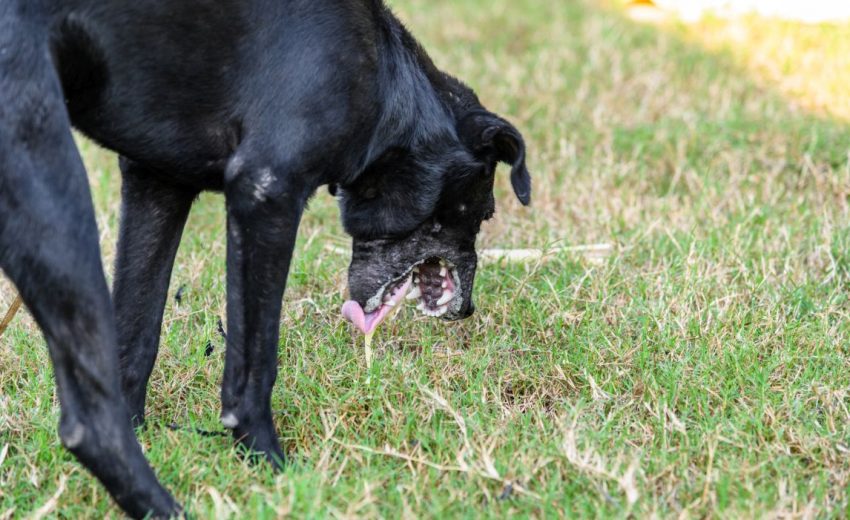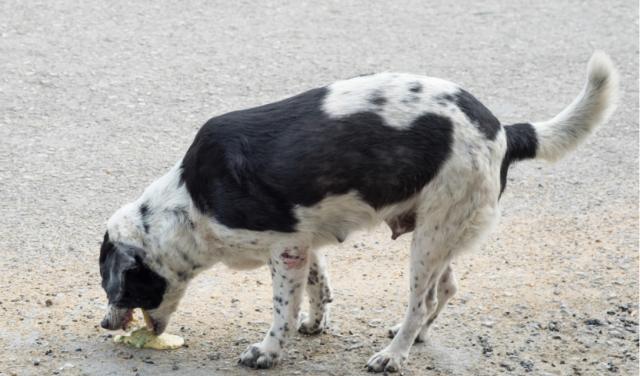Dog Vomiting is a natural reaction. Anything from a minor instance of overeating to significant medical conditions can set it off. Dog Vomiting is frequently linked to minor, self-limiting illnesses that respond to simple diagnostic testing and treatment. It can, however, be linked to debilitating illnesses that are life-threatening.
There are various reasons why dogs vomit. It’s possible that your dog ate more than they could eat or ate too quickly, or that your dog ate too much grass. When your dog vomits, the contents of his stomach or upper intestine are forced out.
The cause could be more serious at times. It’s possible that your dog ate something poisonous, or it might be an indication of a serious illness. Identifying the underlying reason for your dog’s vomiting will help you evaluate whether or not you need to seek immediate medical treatment.

A dog who vomits once and then resumes normal bowel motions and feeding habits will usually recover without incident. Chronic vomiting or vomiting accompanied by other symptoms, on the other hand, should be investigated by your family veterinarian to rule out potentially serious underlying causes.
Table of Contents
Vomiting and Regurgitation
If your dog is vomiting or regurgitating, you should be able to tell. Regurgitation is a relatively passive process in which the dog merely lowers their head and food comes up, rather than active stomach contractions as in vomiting. The meal that is regurgitated is frequently undigested and devoid of bile. However, vomit is only half-digested and contains bile. Almost always, your dog will try to eat regurgitated food.
Causes of Dog Vomiting
The following underlined health issues can cause Dog vomiting and these include
- Obstruction of the intestines
- Constipation
- Pancreatitis
- Cancer
- Kidney failure
- Liver failure
- Intestinal parasites
- Bacterial infections (gastrointestinal tract)
- Toxic chemicals ingestion
- Diet changes
- Food intolerances
- Bloat
- Foreign substances in the gastrointestinal system
- Heatstroke
- Acute renal failure
- Pancreatitis
- Acute liver failure
- Medications
- Inflammation of the intestines
- Parvovirus
- Colitis
- Uterine infection
Symptoms of Dog Vomiting

Dog Vomiting can have any symptoms which could be any of the following
- Weakness
- Depression
- Dehydration
- Fever
- Loss of appetite
- Changes in urine frequency
- Changes in thirst
- Blood in vomit or stool
- Unusual or severe tiredness
- Diarrhea
- Collapse
- Gums that are pale or white
- Weight loss
- Abdominal pain
Diagnosis of Dog Vomiting
Your dog’s history, in addition to a thorough medical examination, is an important factor to consider when making a diagnosis. To confirm the initial diagnosis, your veterinarian may order certain laboratory tests and procedures (blood tests, ultrasound, x-rays, urinalysis, biopsy, and so on).
The majority of the underlying problems are curable, especially if medical help is sought early. Many causes of recurrent vomiting may not go away on their own and require veterinary help.

Treatment of Dog Vomiting
Treatment for dog vomiting varies based on the severity and origin of the problem. The type of treatment depends on your dog’s overall condition. If the vomiting is caused by an infection, your veterinarian may prescribe antibiotics. Anthelmintic, which is used to control vomiting, is another option. The dog may also require hydration therapy in some circumstances. In severe circumstances, surgery may be recommended.
Treatment might be as easy as a food adjustment if the vet filters out any underlying issues. Dehydration, electrolyte imbalances, and acid-based illnesses can all be caused by dog vomiting. These issues will be addressed by your veterinarian by treating the symptoms and, in some circumstances, prescribing anti-nausea drugs.
Prevention
- Garbage containers should be secured to prevent your dog from accessing them.
- Don’t give your dog toys that are readily eaten or chewed.
- When starting a new diet, start slowly and progressively over a week or two.
- Bones that can be ingested whole or fractured into sharp shards should be avoided.
- Table crumbs are strictly forbidden. Some human foods include hazardous elements for dogs.
RECOMMENDED ARTICLES
- Greater Swiss Mountain Dog – Characteristics, 6 Comprehensive Behaviour And Health
- 10 Best Natural Dog Food For Healthy Living And Nutrients
- What Is Food Allergy In Dogs – 9 Guaranteed Symptoms And Treatment
- 10 Comprehensive Dry Dog Foods For Total Well being
- 10 Top Best Dog Food Brands And The Composition There
- 13 Top Best Puppy Food And Their Nutrient Components




